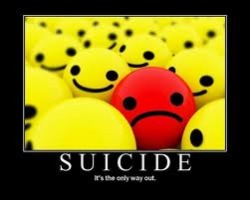 On The Precipice Of The Abyss
On The Precipice Of The Abyss
What do you do when your world is spinning out of control, when you are fighting a maelstrom of voices, ideas, and frustrations yelling at you all the time, and when you are crying out for help? Those who are supposedly there to help you ask, “Are you thinking of suicide, of hurting yourself, or physically hurting others?”
You answer, “No, but my world is spinning, the confusion is great, the mental anguish unbearable. I can’t make it alone. I really need help!”
They reply, “I am sorry, but you do not qualify for our services, or help, at this time. You are in no danger of hurting yourself or others, so go see your family doctor or psychiatrist when you are lucky enough to get an appointment (which may take days, even weeks). We are an acute facility, and the services you need are at a lower level than we provide.” [“Let someone else fix your problems; we won’t,” is the message you hear from their response.]
You find yourself on the “precipice of the abyss”, ready to fall in to more traumatic painful experiences because there is no help immediately available, so you go to your pastor, priest, or rabbi for help. What does he have to offer?
 The “Press” loves a new story, a new scoop, an eye-catching headline. Journalistic careers are defined at the expense of other people’s tragedies. This week we experienced another shooting by an “isolated loner” at a movie theater in Colorado, the largest single shooting death in American history. The past records one “isolated loner” who took the lives of Virginia Tech students, one who shot Congresswomen Gifford also in Colorado, as well as other recorded stories. Often after the victims are buried and the story now becomes “old” in the eyes of the Press looking for a new, fresh scoop, we never hear of the tragic lives of the “isolated loners” who tottered on the “precipice of the abyss” before falling into insanity. Often their despicable act was actually a cry for help to which no one responded until it was too late. How does our penal system address “isolated loners” placed into their care? Simply by placing them in more “isolation”, often not treating them with proper medication unless the “isolated loner” is lucky enough to get a court order. How long are we going to allow the standard for help for the mentally ill to be “violence” and “tragedy”? We know extreme mental illness can be dangerous and damaging if not treated properly, yet we play with fire and not give help until it is too late.
The “Press” loves a new story, a new scoop, an eye-catching headline. Journalistic careers are defined at the expense of other people’s tragedies. This week we experienced another shooting by an “isolated loner” at a movie theater in Colorado, the largest single shooting death in American history. The past records one “isolated loner” who took the lives of Virginia Tech students, one who shot Congresswomen Gifford also in Colorado, as well as other recorded stories. Often after the victims are buried and the story now becomes “old” in the eyes of the Press looking for a new, fresh scoop, we never hear of the tragic lives of the “isolated loners” who tottered on the “precipice of the abyss” before falling into insanity. Often their despicable act was actually a cry for help to which no one responded until it was too late. How does our penal system address “isolated loners” placed into their care? Simply by placing them in more “isolation”, often not treating them with proper medication unless the “isolated loner” is lucky enough to get a court order. How long are we going to allow the standard for help for the mentally ill to be “violence” and “tragedy”? We know extreme mental illness can be dangerous and damaging if not treated properly, yet we play with fire and not give help until it is too late.
Could these tragedies be avoided? Probably yes! The worst possible environment for anyone severely struggling is “isolation”. The Church is about community, people. They are people struggling, people reaching out, people listening, people helping, etc. If you are lucky enough to be in a church built on relationships and care rather than programs, you can find an environment that prohibits you from being that “loner” in times of trouble and distress, that brings encouragement during depression, and some sanity during insane moments. People, not programs, make a difference. People provide personal care, encouragement, empathy, communications, etc. while programs give only canned institutionalized solutions to complicated problems.
IJohn 3:16’s “laying down your life for your brethren” is the key ingredient in helping the “isolated loner” who feels that “no one cares” for him or her. Helping them monitor medications, organizing their day, giving encouraging direction, supporting them mentally, emotionally, and even sometimes financially is part of this “laying down one’s life for his/her brethren”.
I recently heard a brother-in-the-lord summarize the dilemma that the American Church faces: everyone being too busy. He stated, “A shut-in I know complained that no one visits her or her disabled husband, but I too have a family to supply, a business to run, a cabin in the mountain that needs mowing this week, activities to run my kids to, a small group through the church that meets in my home as well as attend other necessary church functions on Sunday and throughout the week. My wife would like for me to have a free night with her some night. Hey, lady, we all are busy, but I hear your need and wish that I could help.”
 I have heard some in church leadership refer to their parishioners who are fighting mental illness as “high maintenance”, not as “high priority”. If the church is to be effective, it has to “reach out” to those “isolated loners” and “pull them out” of their isolation through relationships and constant interaction. The book of Acts is all about a church of “inter-ACT-ion”. If we can’t rely on government interaction, or civic organizational interaction, or church interaction, then where is a loner to find the interaction that he or she needs to remain healthy?
I have heard some in church leadership refer to their parishioners who are fighting mental illness as “high maintenance”, not as “high priority”. If the church is to be effective, it has to “reach out” to those “isolated loners” and “pull them out” of their isolation through relationships and constant interaction. The book of Acts is all about a church of “inter-ACT-ion”. If we can’t rely on government interaction, or civic organizational interaction, or church interaction, then where is a loner to find the interaction that he or she needs to remain healthy?
 A personal hug, phone call, greeting, visit, email, tweet, voice message, instant message, etc. in a “social networking” age can be benefit in keeping one “connected”. The church needs to raise the bar on those “connections” to be effective. The Church is us, the people, the believers, and we are called by the Great Commission to “go out”, even to the mentally ill, the “isolated loner”, the rejected, and the hurting. The Church can make a difference; so let’s be “difference makers”!
A personal hug, phone call, greeting, visit, email, tweet, voice message, instant message, etc. in a “social networking” age can be benefit in keeping one “connected”. The church needs to raise the bar on those “connections” to be effective. The Church is us, the people, the believers, and we are called by the Great Commission to “go out”, even to the mentally ill, the “isolated loner”, the rejected, and the hurting. The Church can make a difference; so let’s be “difference makers”!